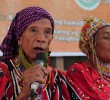Dr John Chipman
Thank you. I think what I will do is I will bring in Minister Bogollagama first. You were asked principally about whether you had under-invested in maritime security and, therefore, invited the special challenge that the Sea Tigers now pose. I might add to that question the further question about how much the Sea Tigers are actually indirectly affecting the potential growth of the Sri Lankan economy. It is known that the claims for Tamil Eelam cover much of the coast of Sri Lanka, and particularly that part of the coast of Sri Lanka offshore of which a great deal of oil is expected to be explored should the security situation allow and a number of international companies, whether it�s Chevron or Indian companies are deterred from exploring oil off what they style Tamil Eelam because of the increased proficiency of the Sea Tigers in causing problems. So you might add a few comments on that and I will return to the Philippines and Indonesia to answer this question of intelligence sharing.
Rohitha Bogollagama
Thank you Chairman. In fact, I am glad that I could respond to some of the very pertinent applications in the context of Sri Lanka�s perspective.
How we have been looking at the intelligence aspect in terms of the need for us to cooperate with other countries in sharing that. We are today structured in several bilateral agreements and seeking the international cooperation in intelligence sharing because the LTTE in Sri Lanka they do manufacture arms. What comes into Sri Lanka, as correctly stated earlier from an individual from this audience, is all coming from overseas locations. How have they been able to bring this to Sri Lanka? They pass through several ports.
There are loading ports, discharging ports and transiting ports. There are some parts come in containers getting loaded or in great bulk vessels. In midstream there are so many transiting points through which they get transit, so this chain has to be arrested and to us which we need international bilateral cooperation with other countries. We are today structuring several measures in that direction. We cited this issue before this conference concluded only in March, in Delhi in India. There is a comprehensive terrorism combating resolution amongst the nations today, in all its manifestations to direct all our efforts towards intelligence sharing in the combating of terrorism.
We are also working with the Indian authorities. Where the Palk Strait is concerned between India and Sri Lanka there are several instances and incidents that takes place on a routine basis. LTTE, targeting the Indian fishermen, and also preventing any other fishing activities because they fear the LTTE movement in relation to the arms smuggling is getting affected with the presence of the navies from both countries. Therefore, we have now structured and proposed a coordinated patrolling arrangement in the Palk Strait state between India and Sri Lanka.
We are also seeking the regional cooperation, particularly from India, in the other areas of service through their satellites and the radars that can be more or less for this objective.
We also need oral intelligence share for which we are now working with the other Governments both in the eastern region and that of the western region. From the west we shine intelligence, we want intelligence cooperation to know the fund-raising arrangements of LTTE through their front organisation. I must appreciate the efforts of the United States of America, that of Canada, that of France and the EU and the United Kingdom in this direction. Several areas are now taking place in Baltimore, in New York and also in Paris. Recent research has been made in terms of fund-raising operations by the LTTE.
That is, again, cooperation that we have got. Then these funds getting transferred to banks in the eastern region of the world, and from there they go to the arms procurement, and also on the narcotic straights, we need intelligence sharing, how these things are moving because today 50% of the youth population in the Maldives are affected with the drug menace and drugs have moved through this terrorist organisation through their capability to navigate through the waters in the region.










